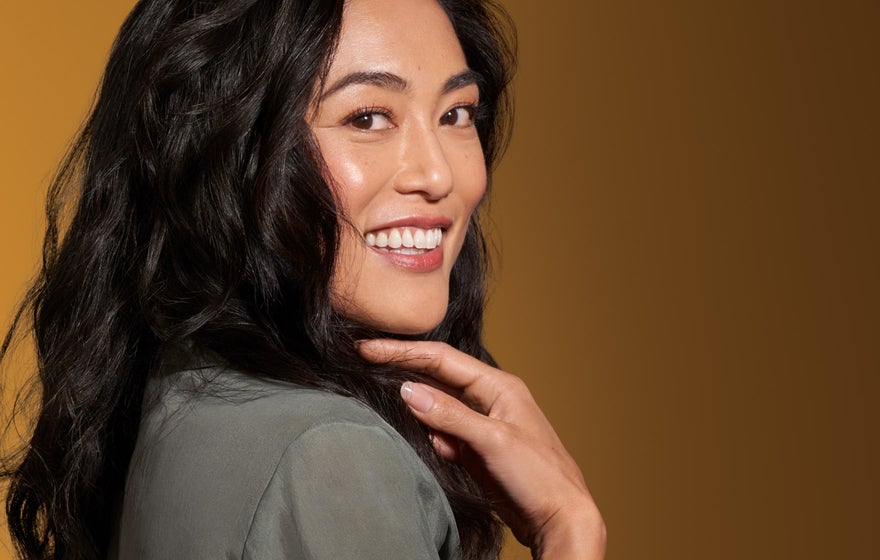
Our expressions are part of who we are. However, that doesn’t mean all of us are happy with expression lines constantly showing, that make us look sad, tired or angry, even when we are not. It is no wonder that injectables to reduce expression lines such as glabellar lines and crow’s feet are sought-after treatments. Some worry that injectables can make them end up with a 'frozen look'. This is not the case. You can simply say no to a frozen face.
Common reasons for reducing the appearance of expression lines
If you are troubled by expression lines, you are not alone. Quite a lot of people are worried about expression lines such as glabellar lines and crow’s feet, and many times it has nothing to do with vanity or a desire to reduce expression lines.
In an observational study1 published in JAMA Dermatology, men and women who had undergone treatment with injectables for expression lines and other cosmetic procedures were asked about their motivations. Apart from motivations such as the desire to have a beautiful skin and a youthful, attractive appearance:
- 67% desired to feel happier and more confident or to improve the total quality of life
- 61% wanted to treat themselves or celebrate
- 55% wanted to look good professionally
So, there are many reasons why people ask for injectables and other minimally invasive procedures that have not much to do with vanity.
Why do we end up with expression lines?
Expression lines appear as we express our emotions, for example, when we smile, laugh or frown. Typical expression lines are crow’s feet (the wrinkles at the outer corners of your eyes) and glabellar lines (the vertical frown lines between your eyebrows). When we are young, these expression lines disappear when our faces are relaxed. They are so-called dynamic wrinkles, wrinkles that form as we move our face, but disappear when our face is at rest.
With ageing, due to changes in the underlying structure of our skin, wrinkles and folds appear that can alter the appearance of our face. Dynamic wrinkles become static and do not go away when our face is at rest. The appearance of crow’s feet and glabellar lines can cause our face to look tired, angry, old or sad regardless of how we feel.
Expression lines can affect quality of life
When there is a disconnect between what our faces express and how we feel, it can affect our self-esteem and quality of life. When people ask for injectables to reduce the appearance of crow’s feet or glabellar lines, it is not only about looking better. They want to remove the lines that prevent them from expressing themselves the way they want, and they want to feel happier, be more confident and improve their quality of life.
Of course, people’s perception of their appearance differs from person to person. Some people are not bothered at all by crow’s feet or glabellar lines, whereas others are very troubled by them. If you have expression lines that bother you, you have perhaps started looking for remedies such as injectables.
Most people desire a natural result from injectables
In general, when people have injectables to reduce expression lines, they want the treatment to make them look rested and relaxed. There is also a desire for the treatment to allow them to maintain their natural expressions and not leave them with a frozen look. So how can you avoid a stiff or frozen face? And why do some people end up with a frozen face?
The purpose of aesthetic treatments, injectables and others, is actually not to make you look 'done'. They are supposed to give you the result you desire. Since most people want to look natural, they will ask for treatments that reduce expression lines without making their faces stiff. This means that you might not even notice that someone has had treatment at all, since it looks so natural. What you tend to notice are those who do not look natural. That doesn’t necessarily mean their treatment went wrong. Most probably, they have asked for that particular look. People who desire a stiffer kind of look are not representative for most of those who have injectables. And the most important thing: You decide what kind of result YOU want.
Ask for what you want
Before you have an aesthetic treatment, you will always have a consultation with your healthcare practitioner. A qualified and experienced healthcare practitioner will listen to your concerns and desires and adjust the treatment according to your wishes and anatomy. If you want to reduce the appearance of crow’s feet and glabellar lines, but still want to maintain your natural expressions, that is the kind of treatment you will receive. So just say no to a frozen look.
Make sure to contact a qualified healthcare practitioner
As should be clear by now, the best guarantee to get the looks you want is to contact a clinic with good credentials and qualified healthcare practitioners. He or she will listen to your concerns and worries and help you get the result you desire.
References
- Maisel A, Waldman A, Furlan K, et al. Self-reported Patient Motivations for Seeking Cosmetic Procedures. JAMA Dermatol. 2018;154(10):1167-1174.
